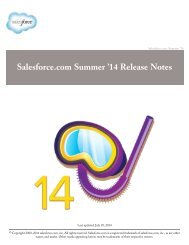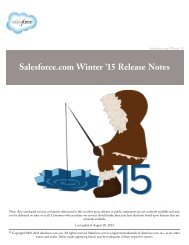Q4 Mobile Security and Risk Review
security-report-Q415-v1.2-EN
security-report-Q415-v1.2-EN
You also want an ePaper? Increase the reach of your titles
YUMPU automatically turns print PDFs into web optimized ePapers that Google loves.
data at risk of loss. Such loss can occur from unauthorized access to the cloud-based files<br />
in which the data may be stored or from intentional leakage to unauthorized persons. In<br />
any event, absent the data monitoring <strong>and</strong> cloud access control features of a modern EMM<br />
solution, the enterprise has little visibility or control over data leakage via cloud services.<br />
One unsophisticated <strong>and</strong> outdated method for trying to manage data leakage via the cloud<br />
is “blacklisting.” Blacklisting is a policy within a mobile application management system that<br />
allows a device to be quarantined, selectively wiped, or blocked when a blacklisted app is<br />
detected. In the early days of mobility, blacklisting was a st<strong>and</strong>ard approach used to block<br />
unwanted apps in the enterprise. These policies were traditionally manually created by the<br />
administrator but are simply not scalable with the enormous number of mobile apps available<br />
today.<br />
More importantly, in many cases, such outdated tools <strong>and</strong> policies fail to distinguish cloud<br />
services apps that are designed to enable enterprise data migration control (e.g., via managed<br />
“open-in” features or enhanced user authentication) from “consumer” apps.<br />
More recent versions of EMM solutions (such as <strong>Mobile</strong>Iron) use the managed application/<br />
containerized approach to enable administrators to blacklist the unauthorized (consumer)<br />
version of cloud apps while allowing the managed (enterprise) version of such apps. As our<br />
data shows, five of the top 10 blacklisted apps are consumer versions of an EFSS app.<br />
The top 10 consumer apps most often blacklisted by enterprises are:<br />
1. Dropbox (consumer version)<br />
2. Angry Birds<br />
3. Facebook<br />
4. Microsoft OneDrive (consumer version)<br />
5. Google Drive (consumer version)<br />
6. Box (consumer version)<br />
7. Whatsapp<br />
8. Twitter<br />
9. Skype<br />
10. SugarSync (consumer version)<br />
Thus, a “next-generation” EMM solution allows the administrator to permit an enterpriseapproved<br />
cloud sharing app, such as Dropbox for Business or Box for EMM, while blocking<br />
unauthorized consumer apps from storing enterprise data in the cloud. Identity protection <strong>and</strong><br />
cloud access control solutions now provide additional layers of protection to mitigate data<br />
loss.<br />
10 <strong>Q4</strong> <strong>Mobile</strong> <strong>Security</strong> <strong>and</strong> <strong>Risk</strong> <strong>Review</strong>, October 1 - December 31, 2015






